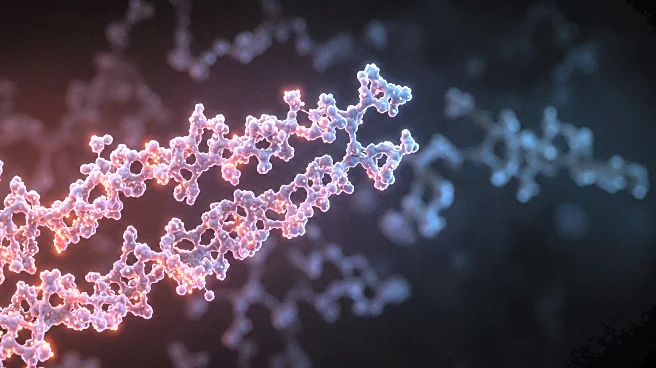What's Happening?
Researchers at the Massachusetts Institute of Technology (MIT) have developed two new potential antibiotics using artificial intelligence (AI) to combat drug-resistant strains of gonorrhoea and MRSA (methicillin-resistant Staphylococcus aureus). The AI designed these antibiotics atom-by-atom, and they have shown effectiveness in laboratory and animal tests. Despite the promising results, these compounds require further refinement and clinical trials before they can be prescribed. The study, published in the journal Cell, involved training AI with the chemical structures of known compounds and data on their effects on bacteria. The AI then designed new antibiotics by analyzing 36 million compounds, including those not yet discovered. This approach marks a significant advancement in antibiotic discovery, potentially ushering in a 'second golden age' for the field.
Why It's Important?
The development of new antibiotics is crucial as drug-resistant infections are causing over a million deaths annually. The overuse of existing antibiotics has led to bacteria evolving resistance, creating a shortage of effective treatments. The use of AI in designing antibiotics offers a novel approach to addressing this issue, potentially expanding the arsenal against superbugs. This advancement could significantly impact public health by providing new solutions to combat resistant infections. However, the economic challenge remains, as new antibiotics need to be used sparingly to preserve their effectiveness, which may limit commercial profitability.
What's Next?
The next steps involve refining the AI-designed antibiotics and conducting extensive clinical trials to ensure their safety and efficacy in humans. This process is expected to take one to two years before testing can begin. Researchers are also calling for improved AI models that better predict drug effectiveness in the human body, beyond laboratory performance. The challenge of manufacturing AI-designed antibiotics remains, as only a few of the theoretical designs have been synthesized into actual medicines. Addressing these challenges will be crucial for the successful implementation of AI-driven antibiotic discovery.
Beyond the Headlines
The use of AI in drug discovery raises ethical and economic questions, particularly regarding the commercial viability of new antibiotics. Since these drugs need to be used minimally to prevent resistance, their profitability is uncertain. This situation highlights the need for innovative economic models to support the development and distribution of life-saving antibiotics. Additionally, the integration of AI in healthcare could lead to broader changes in how drugs are developed, potentially accelerating the discovery process and reducing costs.









